Elvira Kadyrova
On 29 November 2019, the second Consultative meeting of the heads of Central Asian States was held in Tashkent.
The summit was attended by:
- President Shavkat Mirziyoyevof Uzbekistan
- First President of Kazakhstan Nursultan Nazarbayev
- President Sooronbay Jeenbekov of Kyrgyzstan
- President Emomali Rahmonof Tajikistan
- President Gurbanguly Berdymuhamedov of Turkmenistan
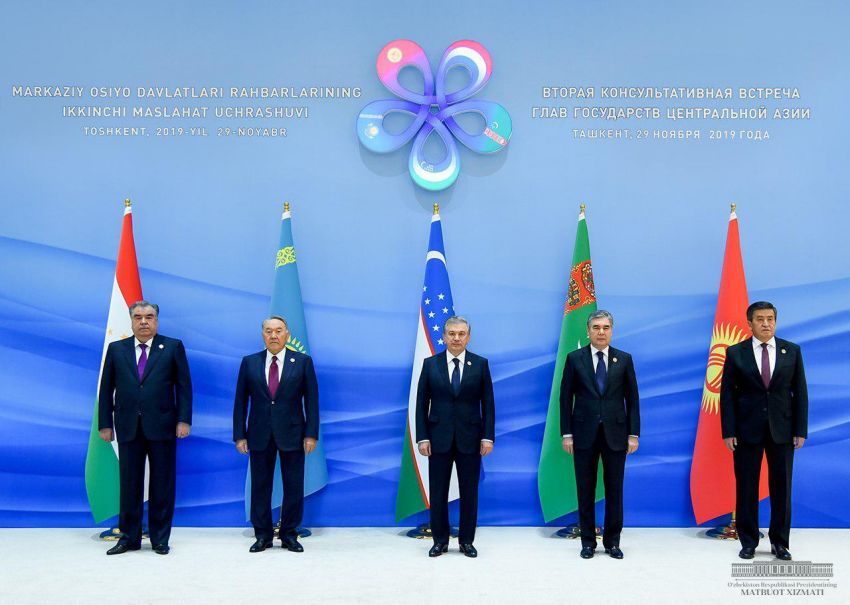
The summit provided a good opportunity to discuss ways of rapprochement of regional countries and addressing common challenges.
The summit resulted in adoption of Joint Statement and the Procedures for holding of consultative meetings.
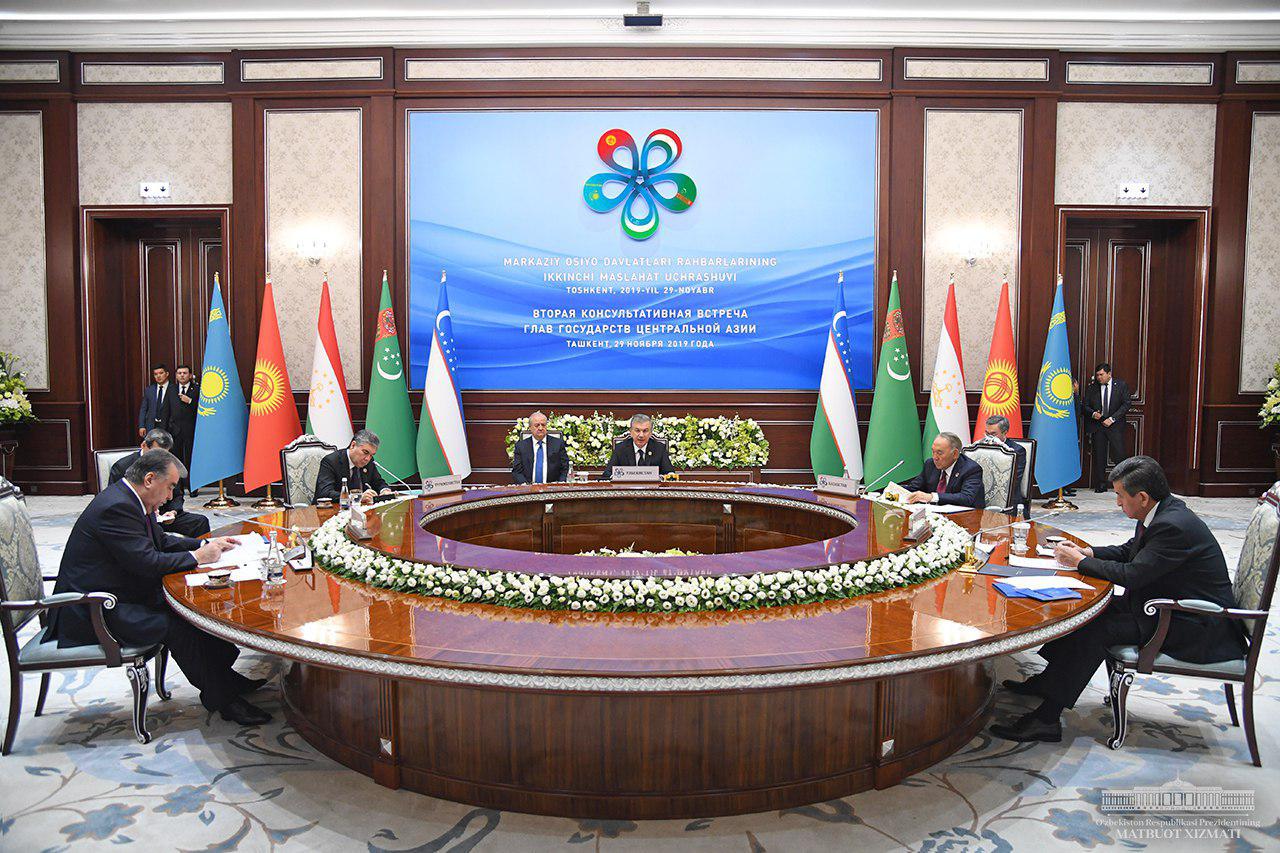
The decision on transfer of chairmanship in the International Fund for saving the Aral sea from Turkmenistan to Tajikistan for the period 2020-2022 were also approved.
Bishkek, Kyrgyzstan will host the next Consultative meeting of the heads of Central Asian states in 2020.
Uzbekistan proposes to establish an investment forum and transport council in Central Asia
The President of Uzbekistan Shavkat Mirziyoev noted that “the current conditions of the rapidly changing situation in the world, the escalation of security threats and growing factors affecting the stable development, necessitate the strengthening partnership based on mutual trust and coordination”.
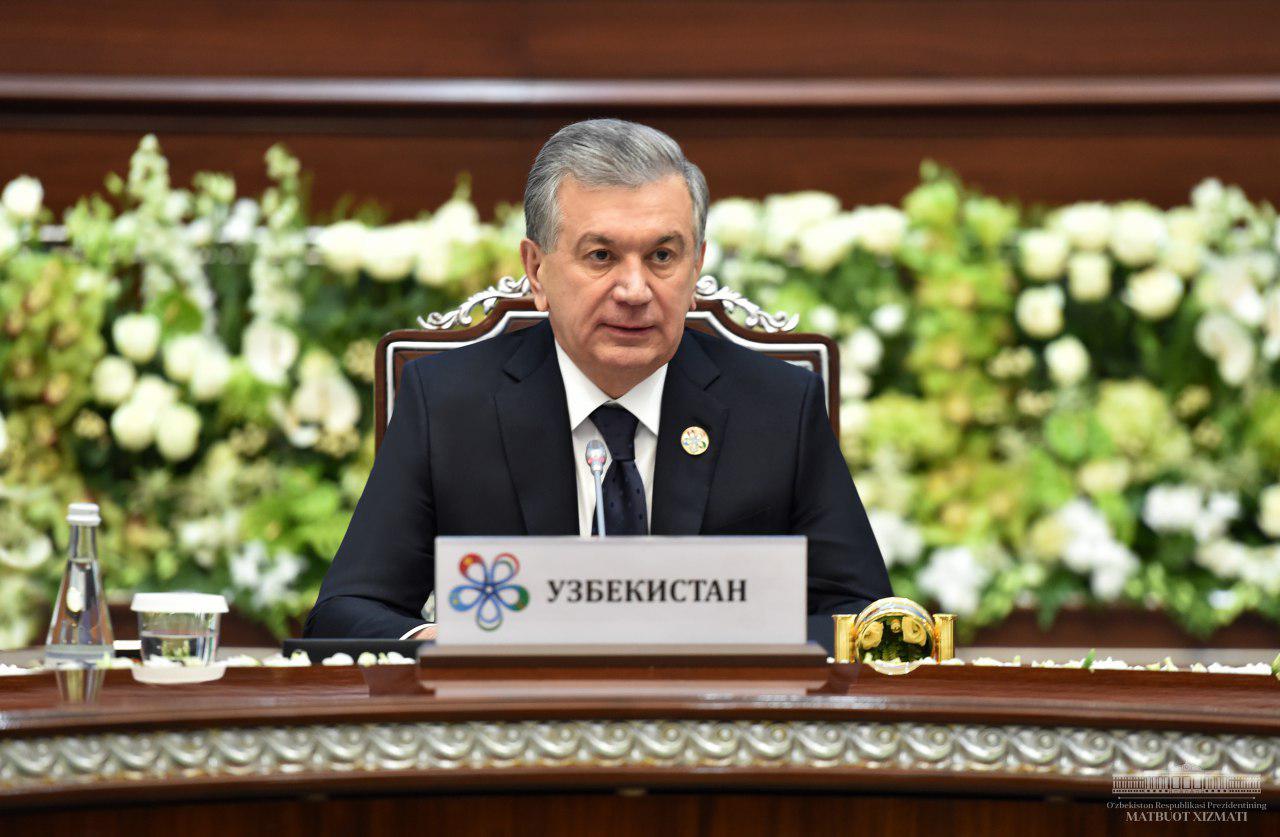
The Uzbek leader presented several initiatives aimed at developing a common vision of multilateral cooperation in Central Asia.
First, it is the deepening of trade, economic and investment ties, the need for joint promotion of cooperation projects in various sectors of the economy such as agricultural machinery, automotive, electrical, textile industry, and the agricultural sector.
The holding of the Investment forum of Central Asian countries in Tashkent, organizing annual meetings of heads of chambers of commerce and industryhave been proposed for this purpose.
Secondly, it is the strengthening of connectivity and unlocking of the transit potential of the region.
Uzbekistan stands for the establishment of the regional Council for transport communications, to agree on programs and agreements for the joint development of the transport system in Central Asia.
Thirdly, the expansion of cooperation in the energy sector, taking into account the long-term interests of the region. Uzbekistan expressed readiness to consider opportunities for joint projects to create modern energy infrastructure in the region, paying special attention to increasing the share of renewable energy sources.
Fourth, the joint formation of a recognizable tourist brand and image of Central Asia. To this end, the President of Uzbekistan proposed to hold an International tourism conference titled “Journey through Central Asia”.
Kazakhstan initiates signing of five-party treaty on friendship and cooperation
On the proposal of the President of Turkmenistan, the First President of Kazakhstan Nursultan Nazarbayev was elected Honorary Chairman of the Consultative meeting.
During his remarks, Nazarbayev proposed to conclude a five-sided Treaty on good neighborliness and cooperation for the development of Central Asia in the 21st century.
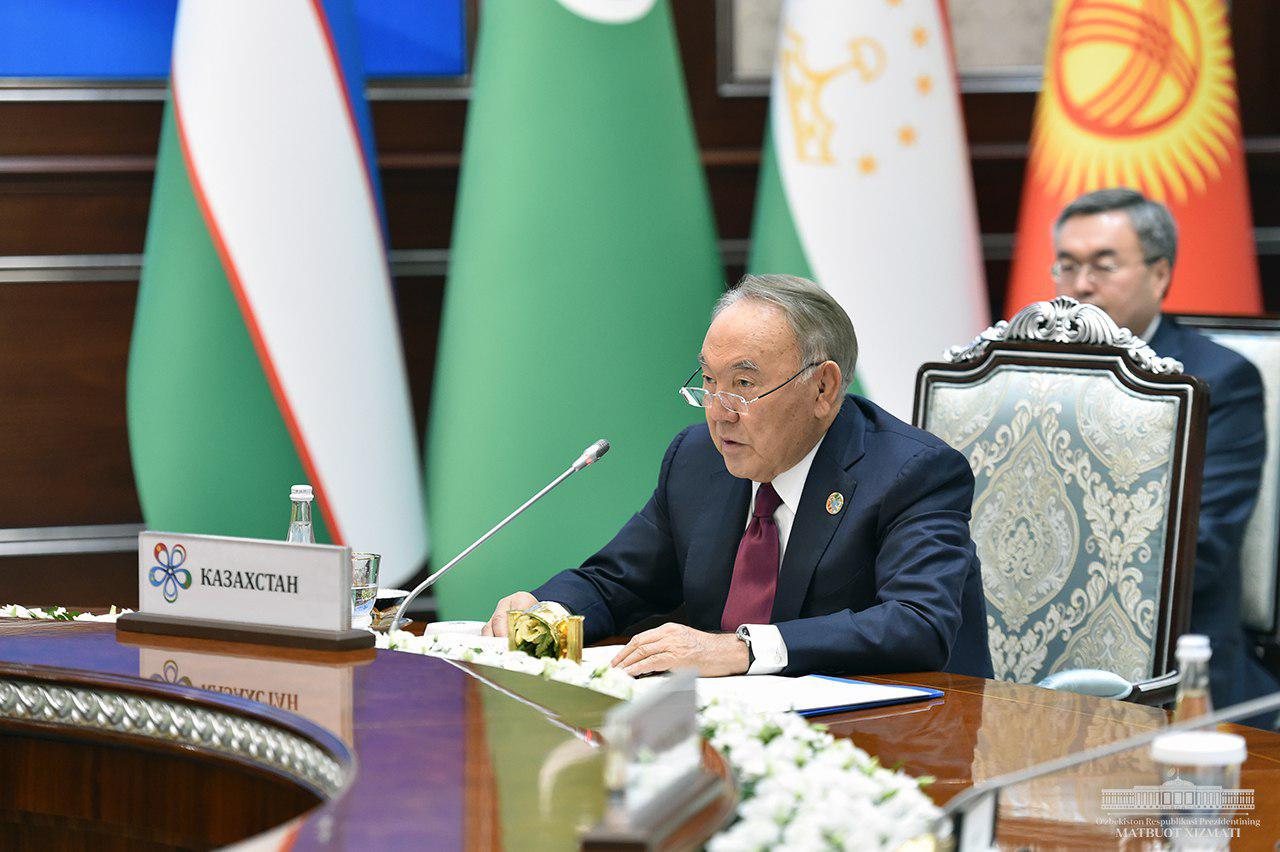
This fundamental policy document should reflect the basic principles and objectives of cooperation in the region. The agreement will also fix the principle of mutual respect for the sovereignty, independence and territorial integrity of the five countries, he said.
In order to enhance security in the region, Nazarbayev told on the need to convene a meeting of the secretaries of the security councils of the Central Asian countries next year.
Also, the first president of Kazakhstan commented on the need to remove barriers between the five countries for the free movement of goods, services and capital.
Nazarbayev also called for all heads of state to declare 15 March the day of Central Asia.
A number of initiatives touched upon the humanitarian cooperation. Kazakhstan offers to allocate 10 grants for students from each country of the region for study in the best universities of Kazakhstan.
Nazarbayev invited all leaders to visit Turkestan next autumn. “The cradle of the Turkic world – the city of Turkestan is experiencing its new renaissance. At the same time, it will undoubtedly retain its cultural, historical and spiritual core,” he said.
Kyrgyzstan stands for deepening economic integration of Central Asia
“Integration in Central Asia is of great importance for the successful realization of our economic potential. At the same time, we cannot use the existing potential to the full because of the existing barriers,” presidentSooronbayJeenbekov of Kyrgyzstan said. He outlined in his speech the problems that hinder the formation of a barrier-free space in Central Asia today.
According to Kyrgyzstan, the obstacles to the free movement of people, goods, services and capital are the introduction of bans on the export of certain types of products, bureaucracy in the registration of goods for crossing the border, existing quotas and duties.
In order to remove these complications and thereby increase the volume of trade between the countries of the region, Jeenbekov proposed to switch onfull-scale functioning of the free trade regime, reduce tariffs and duties, simplify customs procedures, facilitate the crossing of borders for goods, ensure unimpeded transit and improve logistics.
Kyrgyzstan also considers it important to develop cooperation between the private sector and mutual free market access for goods.
Water use is among the pressing issues for Kyrgyzstan. 45% of all water resources of the region originate in the mountains of Kyrgyzstan. However, climate change is causing intense melting of glaciers, which can lead to lower water levels in transboundary rivers.
“As a result, it will inevitably affect the ecology of Central Asia, negatively impact joint economic activities, significantly reduce the potential of large hydropower plants,” the president of Kyrgyzstan warned.
In this regard, he proposed to introduce in Central Asia mutual compensation mechanisms for the accumulation of water resources. “We expect the costs of storing, managing and delivering water to be reimbursed accordingly,” he said.
The development of transport and communication corridors that provide access to foreign markets for Central Asian countries is another topic on which the Kyrgyz leader spoke.
“For us, as part of the ancient great Silk Road, the priority is the expansion of international roads and Railways, the creation of logistics centers and transport terminals,” he stressed, urging his counterparts to improve freight and passenger transport in the region or simplified procedures for transit.
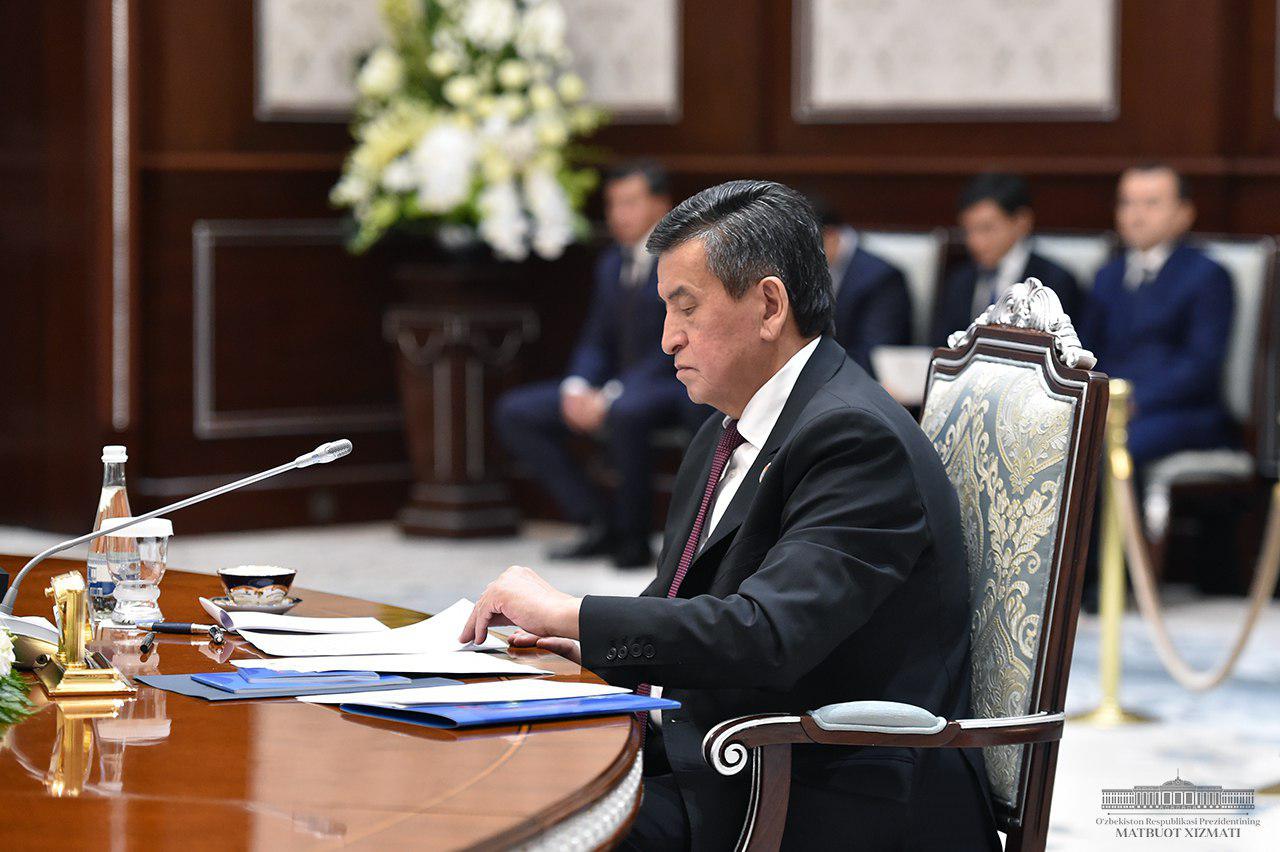
Currently, Kyrgyzstan continues construction works on 13 main roads. The major project is the construction of the China-Kyrgyzstan–Uzbekistan railway.
Jeenbekovalso opened the issues of cooperation in the fight against extremism and terrorism, improving border security.
Tajikistan suggests the creation of Investment Fund in Central Asia
“A close neighbor is better than a distant relative,” Tajik President EmomaliRahmon reminded his counterparts a well-known proverb in Central Asia.
The Tajik leader expressed the idea of creating an Investment Fund of Central Asia to fund the most promising regional projects.
Tajikistan also sees the beneficial development of cooperation with the countries of Central Asia in the field of agriculture, industry, transport and communication infrastructure.
The relevant multilateral agreement on developing a regional mechanism for transport and transit cooperation could be concluding, said Tajik leader.
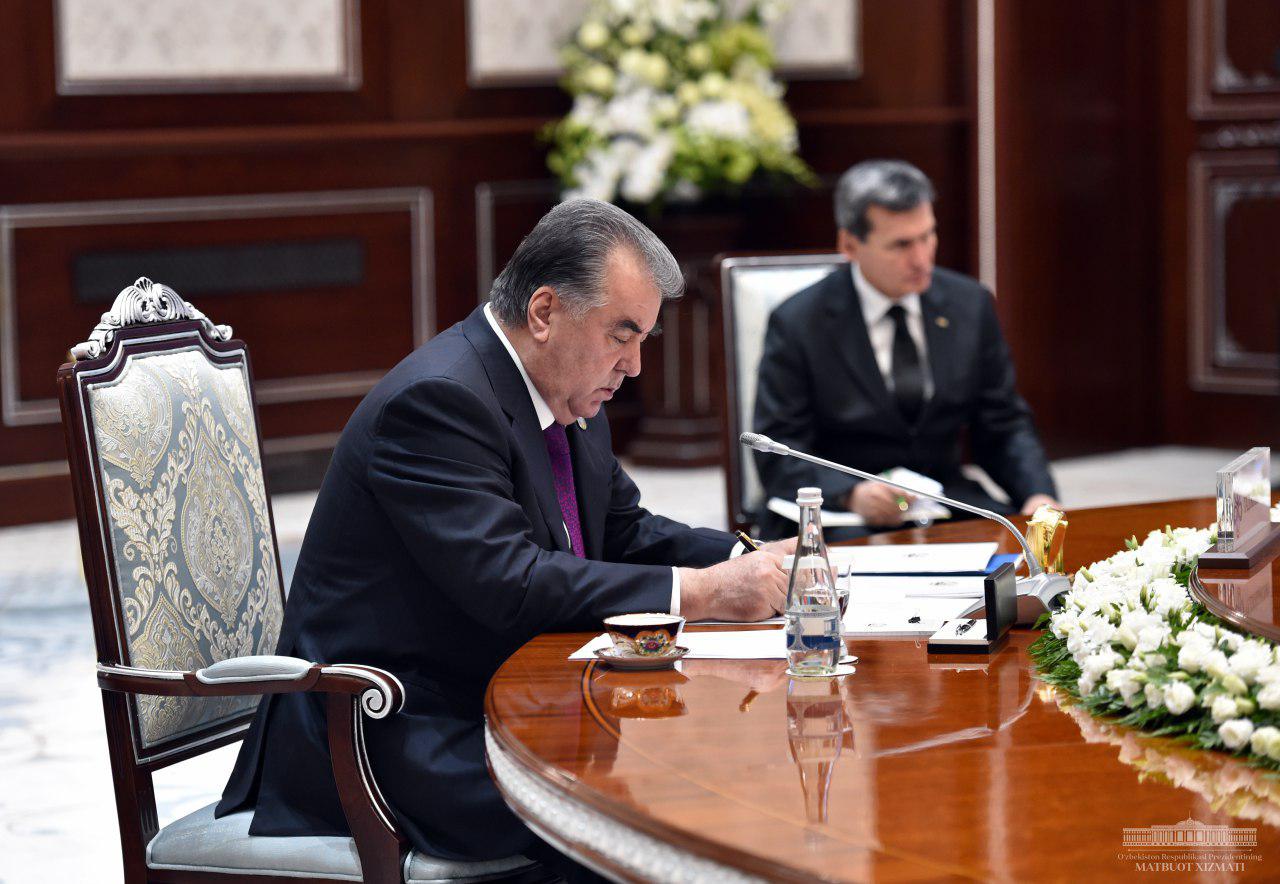
The sharing of water resources was one of topics touched upon by the president of Tajikistan.
“In Tajikistan, where up to 60 % of the water resources of Central Asia are formed, in recent decades there has been a significant reduction in the area of glaciers. To date, 1 000 of the 13 000 glaciers located in the mountains of Tajikistan have disappeared,” Emomali Rahmon stressed, pointing to the need to take urgent measures for the joint development and implementation of regional programs to reduce the impact of anthropogenic factors on the state of glaciers.
The regional security concerns have been also sounded during the Rahmon’s remarks. According to the him, the issues of cooperation in the fight against terrorism and extremism, drug smuggling, the proliferation of transnational organized criminal groups, cybercrime, human trafficking come to the fore.
In this regards, Tajikistan proposes to form a mechanism for holding regular meetings of heads of power agencies and special services.
He also expressed support for international and regional efforts aimed at finding peaceful solutions to the Afghan problem.
Speech of President Berdymuhamedov at the Consultative Summit of Central Asian heads of state
President Gurbanguly Berdymuhamedov made a speech at the summit. Here is the unofficial, slightly paraphrased translation of his speech:
Dear heads of state!
Dear members of delegations!
First of all, let me express my gratitude to the distinguished President of the Republic of Uzbekistan Shavkat Mirziyoyev for his hospitality, cordiality and the conditions created for fruitful joint work.
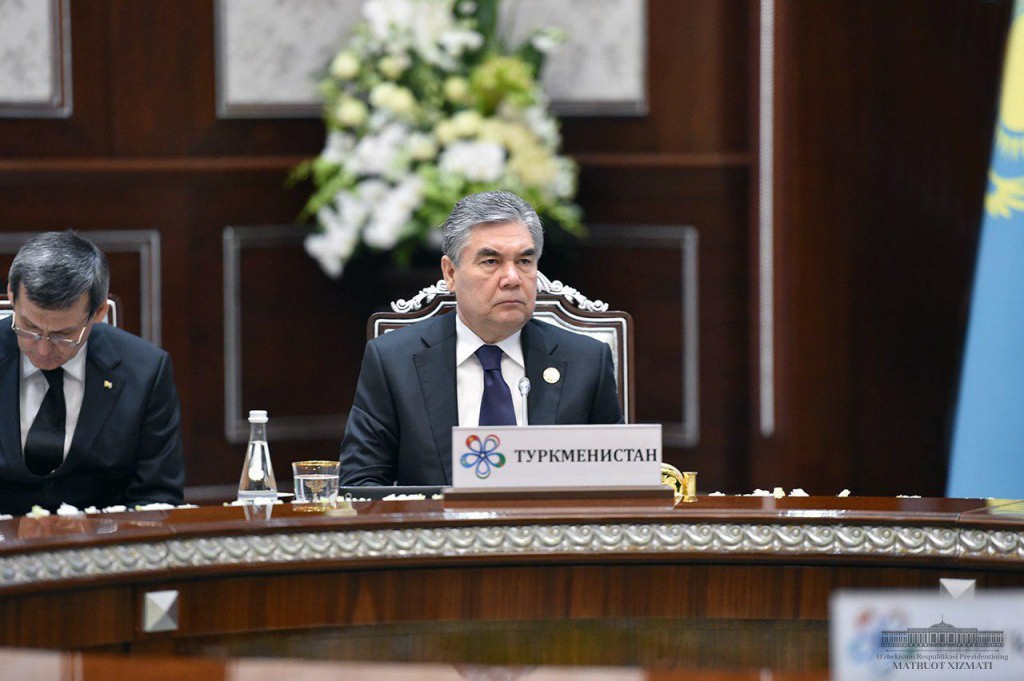
Today’s meeting marks next important stage in the cooperation of the Central Asian states, designed to provide the necessary environment for stable and sustainable development of the region, the establishment of strong and effective mechanisms of interaction between our states, the formation of viable schemes and models for the integration of Central Asia into world community as a worthy, equal and valuable partner.
These tasks are very serious, vital for all of us and each of us individually, and in this sense, the format of Consultative summits level is not only justified, but also very relevant. Today, in fact, we set common goals, and the more important is the opportunity to exchange views, and if there are any concerns or misunderstandings, then directly and openly voice them.
Although, of course, I am deeply convinced that constructivism, the spirit of constructive joint work, the understanding of the commonality and indivisibility of the destinies of fraternal peoples and nations and the determination to achieve the desired outcomes together are the defining factors in relations between the Central Asian countries today.
By setting ambitious goals, we understand that the key to their implementation is lasting and long-term peace, security and stability in our region. I have to say that a lot has been done in this direction recently.
The mechanisms of political consultations at the level of foreign ministers of the five States have started to work. They are held on a regular basis, and they discuss specific issues on the regional agenda, primarily security issues.
I believe that this format of consultations can be supported by closer and coordinated actions of our countries in the United Nations and in the Organization for Security and Cooperation in Europe.
It is necessary to establish in these structures, not episodic, but systemic mechanisms of five-party consultations, with clearly defined priorities. In order that our delegations to have clear guidelines, agreed positions on issues of truly regional importance to advocate them purposefully, relying on each other’s support and reasonably involving like-minded people from other countries.
On such a serious topic as regional security, our countries should always act in a consolidated manner, demonstrating responsibility and firm determination to ensure peace and stability at home.
This is all very important today, when it becomes clear that such phenomena as terrorism, extremism and organized crime pose a real threat to the peace and well-being of entire countries and regions.
In this context, the activities of our states to support the reconciliation processes in Afghanistan are of particular importance.
I reaffirm Turkmenistan’s position, which we have repeatedly stated before. As a neutral state and the closest neighbor of Afghanistan, our country is ready to provide all necessary conditions for the organization of direct contacts between all stakeholders in a peaceful, political settlement of the situation in Afghanistan. We are convinced that there is no alternative to the negotiation process. All previous experience has shown that force methods are counterproductive and have no prospects.
A key condition for the political stabilization, economic and social reconstruction of Afghanistan, its successful integration into regional and world economic processes is the implementation of major infrastructure projects with Afghanistan’s participation, primarily in such vital areas as energy, transport and communications.
Consistently working in this direction, Turkmenistan, has initiated a number of major regional projects, some of which have already been successfully completed. We plan to continue the implementation of significant projects with the participation of Afghanistan and would welcome the involvement of the Central Asian states.
No one knows or feels the scale and depth of the Afghan problem, the aspirations and hopes of the brotherly people better than neighbours of this country. We have a special role to play in supporting Afghanistan. To do this, I believe that our countries need to work more actively in the UN with partner states, the Secretariat, specialized agencies, so that the task of providing comprehensive assistance to Afghanistan does not go by the wayside and remains among the most urgent items on the international agenda.
Dear participants!
Interest external economic and political centers in Central Asia grow every year. It’s natural. Our region is rapidly moving into the category of one of the energy, transport and transit centers of world importance.
The availability of vast natural resources, the benefits of geographical location are objective factors that are attractive for serious investments and implementation of large-scale projects. I am sure that over time, the economic attractiveness of Central Asia for major foreign companies, investment funds and some countries will only increase.
Our task is to do everything possible to ensure that the region meets the modern requirements of healthy economic competition and becomes an integral part of global economic processes as an equal and effective partner. To do this, I think we need to take an initiative in creating a modern energy and transport and transit infrastructure in the region. We are aware that in order to achieve this task, it is necessary to attract large foreign investors.
For us, the Central Asian countries, it is more important to build a long-term strategy of cooperation with external partners, based on common interests and prospects.
It is gratifying that recently the interaction on the formula 5+has significantly intensified. I am referring to the cooperation formats of our five states with the European Union, the United States of America, Russia, Japan and the Republic of Korea. There is interest in this format from other leading countries of the world. The agenda of such meetings can be very extensive and diverse, but the areas like economy, energy, transport and logisticsdominate in them.
In this context, I believe that we need to intensify dialogue with partners in these areas, to prove that the benefits and prospects of long-term investments in the infrastructure of the region, to actively use the levers of international specialized organizations.
The industry, transport and energy were the key topicsat the agenda of the First Caspian economic forum held in Turkmenistan in August this year. The decisive role of the Caspian region and adjacent regions, primarily Central Asia, in the formation of the strategic belt of transport-transit and energy partnership along the East-West, Asia-Europe routes was noted.
In this context, I believe that the landlocked regional countries should actively use the port infrastructure of the eastern coast Caspian sea to export their products to the markets of Europe, Russia, Transcaucasia, the Middle East. Turkmenistan is ready to provide its port facilities on favorable terms.
The possibilities of intraregional transport communication are far from being realized. Of course, there are already examples of joint implementation of a number of projects in this area. But it is too early to talk about systematic work to turn Central Asia into a modern, combined, highly efficient transport hub. We need to work closely on these projects and combine our efforts to develop transport and transit corridors and logistics.
Partnership in the sphere of innovative development and high technologies is a highly relevant topic of our cooperation today. This is dictated by the pace of global development, where innovations is synonymous with efficiency and competitiveness.
I am deeply convinced that all Central Asian countries have the potential for innovative growth, excellent scientific centers, advanced technological developments. It is necessary to join our efforts in this direction, to turn the economies of our countries into the digital dimension.
In general, in order to make our cooperation in trade and economy, energy, transport and logistics, innovative areas purposeful and systematic, I propose to think about creating a five-party Business Council.
This body could perform as a think tank for the formation of a joint strategy of our states on priority areas of economic partnership, make appropriate recommendations to governments, develop specific proposals on the investment agenda of cooperation with foreign business circles.
Dear participants!
Ensuring the sustainable development of Central Asia and improving the quality of life of the population of our countries are directly linked to solving environmental problems in the region. One of them is the saving the Aral sea. At the summit of the founding states of the International Fund for saving the Aral sea (IFsAS) held in Turkmenbashi last August, our efforts in this direction were discussed in detail and certain agreements were reached.
Thus, important steps were taken to improve the activities of the Fund and increase its efficiency. We must continue to move in this direction and make more active use of the potential of the international community, especially the UN and its specialized bodies.
In this context, I believe it is necessary to promote the initiative on the development of a Special UN programme for the Aral sea basin. A good basis for this is the UN General Assembly Resolutions “Cooperation between the United Nations and the International Fund for saving the Aral sea”adopted in April last year and in May this year.
Saving the Aral sea is not only a practical task. It is our duty to history and memory. On the banks of the Aral sea, Central Asian civilization and our identity were largely formed. Therefore, I am convinced that we need to do everything to give back the future to the Aral sea.
A few words about the most important topic for our countries, the conservation and use of water resources. I believe that we should unite our efforts on a common ideological platform, the principles of ensuring equal and fair access to water resources as the commitment of each responsible country. Secondary, local interests and benefits must give way to an understanding of regional goals and priorities and development, on that basis, a common strategy for long-term action.
Turkmenistan’s position is well known. We believe that the consideration and solution of water use problems should be carried out on the basis of universally recognized norms of international law, mutual respect and consideration of the interests of all states in the region and with the participation of specialized international organizations.
Dear participants!
In solving the most important political, economic, technological and environmental tasks designed to ensure Central Asia a worthy place in the 21st century, we rely on a common civilizational foundation, which for centuries formed a unique type of relations between our peoples.
It includes the commonality and closeness of culture, traditions, values and moral attitudes. This is a huge asset that we inherited from our ancestors, which we carefully preserveuntil now,correlate our thoughts and actions with it.
Our culture and history today cement inter-state relations and act as the most important factor of rapprochement between people. By encouraging broad humanitarian contacts and developing cultural ties, we ensure the continuity of the traditions of good-neighbourliness, mutual understanding and sympathy for each other for our peoples.
The creative intelligentsia of our countries has a key role to play in this process. I believe that it could take the initiative to create preconditions for launching a regional cultural dialogue, which would acquire a systematic and regular character. We can call it a forum for cultural dialogue in Central Asia.
Its task, in our opinion, is to establish a comprehensive, multifaceted interaction between the cultural communities of our countries, to promote the rich spiritual and historical heritage of the peoples of Central Asia, modern achievements in the field of literature, arts, cinema, to encourage broad youth contacts.
Dear participants of the Consultative meeting!
Turkmenistan is firmly committed to the further development and strengthening of fraternal and good-neighbourly relations with all Central Asian states. We clearly see the potential and prospects for our cooperation in the fields of politics and security, economy and trade, ecology, science, culture and education. We are united by common goals, consistently moving towards their implementation. I am sure that the present summit will open up new opportunities for this.
Joint Statement of the Consultative Meeting of the Heads of States of Central Asia
On November 29, 2019 the Consultative meeting of the heads of states of Central Asia took place in the city of Tashkent in which the President of the Kyrgyz Republic, President of the Republic of Tajikistan, President of Turkmenistan, President of the Republic of Uzbekistan and the First President of the Republic of Kazakhstan – Elbasy participated.
The participants of the meeting:
proceeding from the common interests of the states of Central Asia in strengthening stability, security and sustainable development in the region, ensuring well-being of its multimillion population,
based on common aspiration of the participating states of Consultative meeting towards expanding multilateral mutually beneficial interaction, deepening regional cooperation and solidifying good-neighborly relations among the countries of the region,
emphasizing primary and key role of the states of Central Asia in tackling urgent problems and acute issues of entire region through negotiations and consultations based on consensus, equality and respect for one another’s interests,
noting that active joint participation of the Central Asian states in addressing important global problems, the initiatives being put forward and implemented by them in the spheres of security, protection of environment, economic, social, scientific and technological, cultural and humanitarian development are receiving broad international recognition,
affirming the unity of opinions that stirring up and strengthening the multifaceted cooperation among the states of Central Asia on the basis of friendship, good-neighborliness and mutual benefit corresponds to the core interests of brotherly peoples and is a key factor of economic and social progress, maintaining peace, stability and security in the region,
proceeding from the need to further strengthen political trust and mutual understanding among the states, stir up and expand the trade-economic, investment, transport-communication and cultural-humanitarian ties, cross-border and inter-regional cooperation,
attaching special significance to deepening interactions in combating international terrorism, religious extremism, illicit drug trafficking, illegal migration, trans-border organized crime and cyber threats,
noting historical significance of the meeting of the heads of states of Central Asia, which took place on January 2, 1998 in the city of Ashkhabad, and the Consultative meeting of the heads of states of Central Asia, which took place on March 15, 2018 in the city of Nur-Sultan, as well as importance of practical implementation by the parties of the secured agreements,
affirming that realization of the initiative to organize regular Consultative meetings of the heads of states of Central Asia as an in-demand dialogue platform with an aim to discuss urgent issues of regional cooperation will promote further strengthening multilateral interstate partnership and cooperation in the region,
state about the following:
- In the conditions of dynamic development of international processes, emergence of new threats, and at the same time, of new favorable opportunities for sustainable development of the states of Central Asia, the demand for a trustworthy dialogue, political consultations and practical interactions among them increases manifold. It is necessary to fully exploit these opportunities in the interests of our countries, striving to make Central Asia a secure and prosperous region.
- The current regular Consultative meeting in the city of Tashkent allowed to discuss in detail the course of advancement of regional interaction in Central Asia and confirmed the principle choice of all states of the region in favor of intensifying mutually beneficial cooperation.
Tashkent consultative summit promotes development of interstate interaction in Central Asia guided by the goals of creating the most favorable conditions for dynamic development of national economies, raising living standards of our countries’ populations, expanding and deepening multifaceted ties in the region.
The Consultative meeting at the highest level allowed to comprehensively consider the prospective directions, forms and mechanisms of further development of cooperation in the areas of trade, economy, investments, transport and transit, agriculture, industrial cooperation, protection of environment, energy, water resources, tourism, science and culture.
- The tendency formed in Central Asia towards regional rapprochement is a historically conditioned reality. Stirring up regional cooperation in the spheres of politics, security, preserving stability and achieving sustainable development in the region correspond to the core interests of the peoples of Central Asian countries, promote bigger consolidation of brotherly ties among them, serve for full-scale realization of the enormous economic and civilization potential of Central Asia.
The contemporary realities show demand and need for stirring up and developing political and diplomatic contacts among the states of the region by way of conducting regular meetings at the highest level, as well as at the level of ministers of foreign affairs of the countries of Central Asia in the form of pentalateral political consultations.
- The political dialogue and positive processes of interstate rapprochement in Central Asia are of an open and constructive nature and not aimed against the interests of third parties. Advancing the regional dialogue and cooperation in concrete priority spheres, above all, in the issues of full-scale realization of the rich economic and human potential of the region, the parties promote establishment of Central Asia as a stable, open and dynamically developing region, reliable and predictable international partner.
The states of the region will continue to strive towards developing open economic cooperation and diversifying ties with other partner countries, international and regional organizations, proceeding from the goals of solidifying regional peace, stability and expanding prospects of economic development of the region, taking into account global tendencies in terms of forming structures of multilateral coordination and cooperation.
- The prospects of stable development in Central Asia are linked to achieving peace in neighboring Afghanistan.
We welcome and support stirring up of international efforts on settling the situation in Afghanistan and in this regard note important significance attached to realization of outcomes of the VII Conference on regional economic cooperation on Afghanistan (RECCA VII), which took place on November 14-15, 2017 in the city of Ashkhabad and the Tashkent conference on Afghanistan «Peace process, security cooperation and regional connectivity», which took place on March 26-27, 2018, as well as the First regional conference «Empowering women in Afghanistan», which took place in September 2018 in the city of Nur-Sultan, as a continuation of the efforts of international community to support peace and reconciliation process in this country.
With a purpose of achieving stable and long-term peace in Afghanistan, we deem it necessary to hold on to key principles of political settlement, above all, abstention from violence, ceasefire, demonstration of readiness to dialogue and compromises.
The states of Central Asia intend to continue comprehensive efforts to involve Afghanistan into regional trade-economic and infrastructure projects which must assist promotion of peace process.
- All states of Central Asia are making important contribution to intensification of regional cooperation and advancement of common interests and needs of their region on the international arena.
The achievements of the Central Asian countries deserve a special attention in terms of elaboration and realization of such large international political initiatives as adoption of the UN General Assembly resolutions «International Decade for Action on «Water for Sustainable Development, 2018-2028» (December 2016), «Strengthening regional and international cooperation to ensure peace, stability and sustainable development in the Central Asian region» (June 2018), «The role of the international community in the prevention of the radiation threat in Central Asia» (November 2018), «Enlightenment and religious tolerance» (December 2018), «Cooperation between United Nations and International Fund for Saving the Aral Sea» (April 2018 and May 2019) and others.
The parties noted productive stirring up of activities of the states of the region in the framework of the Central Asia Nuclear Weapon-Free Zone Treaty (CANWFZ).
We intend to continue to strengthen interaction in the framework of the United Nations and other international organizations, elaborate and jointly promote the new initiatives and projects aimed at consolidating peace, stability, security and supporting sustainable development in Central Asia. This positive tendency corresponds to modern requirements of international political development of our region, promotes strengthening of role and place of Central Asia in the world community, solidifying the weight and influence of our countries on the global arena.
- Noting the need to develop effective economic cooperation in Central Asia based on the principles of mutual support and mutual benefit, the parties stand up for strengthening coordination and deepening regional cooperation in the issues of joint implementation of large economic projects, and particularly, which are aimed at expanding the transport and transit capabilities and developing the energy potential of the region, ensuring stable access to seaports and world markets, developing infrastructure, forming modern international logistics, trade and tourism centers, building new enterprises, introducing innovative technologies and developing «green economy».
The states of Central Asia are ready to undertake joint measures in terms of establishing modern production infrastructure in the region, which meets the priority goals and tasks of policies of the Central Asian countries in the area of industrial development.
In this regard, we confirm our intention to continue active cooperation in the sphere of forming effective regional system of transport corridors and realizing enormous transit potential of Central Asia. Creating interconnected regional transport system, which ensures the shortest access to seaports and new external markets, will reinforce process of reviving the role of the Central Asian region as a global transit corridor which links the South Asia, China and Europe.
The countries of the region are interested in advancing practical implementation of initiatives and projects on developing transit systems in the region, which will have a positive impact on dynamics and volumes of international trade, growth of transit flow of cargo, cost of transportation of raw, equipment and finished products.
We intend to take practical actions aimed at increasing commodity turnover among the countries of the region, including improving treaty and law basis, which regulates the order of crossing goods of the countries of Central Asia on their territories.
- The states of Central Asia are interested in developing and expanding regional cooperation in the sphere of protection of environment, combating climate change and mitigation its consequences for the population of the region.
With these goals we intend to continue to develop and strengthen interaction in the basin of Aral Sea. Paying big attention to the issues of ecology and protection of environment in the region, the states of Central Asia will undertake effective coordination of their efforts in addressing the problems of melting of glaciers, the basin of Aral Sea and uranium tail dumps. We consider it expedient to use capabilities of the International Fund for Saving Aral Sea and the resources of the Multi-partner human security trust fund for the Aral Sea region, established under auspices of the United Nations, to tackle practical tasks in terms of drawing new knowledge and innovative technologies to the region, integrated introducing principles of «green» economy, preventing further desertification, ecological migration and other measures.
Noting importance of reasonable and fair use of water and energy resources in Central Asia, our countries will continue work on improving mechanisms of long-term and mutually beneficial cooperation in this sphere with taking into account the interests of all parties.
- The states of the region intend to continue to take necessary joint measures to settle all remaining issues in the region in terms of development and security by way of common efforts to make the region more stable and prosperous, reinforce the potential of their countries to address contemporary threats and challenges.
With these purposes it is necessary to assist shaping effective forms of cooperation endorsed on the regional level on concrete directions – the trade-economic interaction, social development, security and combating threats and challenges, etc.
- We are committed to the efforts to promote and support development of close cooperation and regional interactions, exchanges and contacts in the areas of science and education, enlightenment, culture, art and sport, supporting youth and developing tourism.
The parties agreed on the need to pay special permanent attention to the problems of youth and take joint measures and adopt programs aimed at supporting young people in realizing their potential, as well as developing dialogue and cooperation among youth organizations of the states of the region in the spheres of culture, science, technologies, entrepreneurship, etc.
The states of the region will continue to deepen mutual cooperation in these spheres with a goal to preserve, strengthen and advance region-wide cultural and scientific achievements of Central Asia, values and traditions which unite the peoples of the Central Asian countries. We are interested to comprehensively promote distribution of knowledge about rich history, culture, civilization, tourist attractiveness of Central Asia in their countries and throughout the world.
- Tashkent Consultative meeting took place in traditionally friendly, warm and trustworthy atmosphere.
We confirm our intention to continue annual consultations at the highest level in the format of the heads of five states of the region, and in this regard, we have agreed to institute the regular Consultative meetings of the heads of states of Central Asia as a regional dialogue platform for trustworthy, constructive and open discussion of urgent issues of regional cooperation in our region and tackling common problems.
In this regard, we have adopted Regulations of work on organizing Consultative meetings of the heads of states of Central Asia, which includes also holding regular meetings of ministers of foreign affairs and expert level sessions.
- The parties sincerely welcome proposal of Kyrgyz Republic to take up a role of chairing side of the next Consultative meeting of the heads of states in 2020 and conduct it in accordance with the adopted Regulations.
The parties expressed gratitude to the President of the Republic of Uzbekistan MirziyoyevShavkatMiromonovich for hospitality and high level of organization of the Consultative meeting.
Tashkent, 29 November 2018
Other events
After the summit, the heads of Central Asian states planted tree seedlings on the Avenue of honored guests at the government residence Kuksaroy.
In the afternoon, the heads of state visited the scientific and educational memorial complex named after Islam Karimov and laid flowers.
An official reception on behalf of the president of Uzbekistan was held in honor of the heads of states of Central Asia.
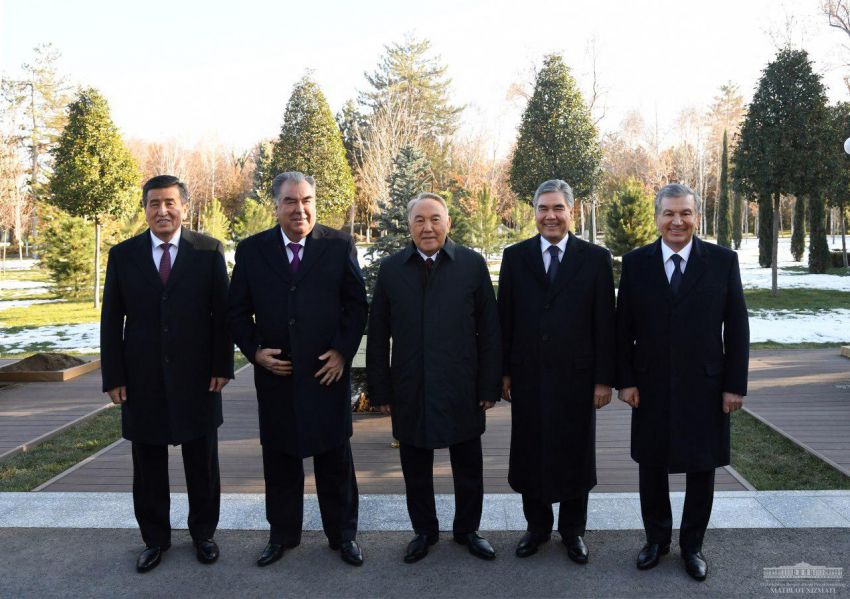
President of Turkmenistan held onboard meeting on the outcomes of the Central Asian summit
Friday evening president Berdymuhamedov returned to Ashgabat.
On board of the plane, he discussed with some DPMs and advisor on oil and gas issues aspects of intensification of Turkmen-Uzbek cooperation.
The president pointed to the need to work out the current directions of cooperation with the Central Asian countries, taking into account the geopolitical and geo-economic opportunities of the region.
The head of state asked the government to consider the possibilities of expansion of the import of agricultural machinery from Uzbekistan.
We need to develop direct ties with the research institutes of the Academy of Sciences and other educational institutions of Uzbekistan, saidBerdymuhamedov.
The president also stressed the need to increase cooperation in the fuel and energy sector with the countries of the Central Asian region, taking into account the gas pipeline stretching from Turkmenistan to China.
The implementation of joint projects in the energy industry, as in transport and transit, will lead to the development of multidimensional relations between the two countries and lay a basis for full integration into the world economy, he said. /// nCa, 2 December 2019